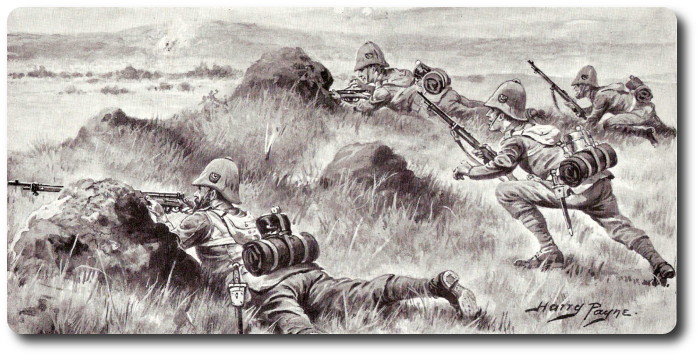Topic: Paardeberg

Cronje's last Stand
Boer Chief Asked For an Armistice to Bury His Dead
An Unconditional Surrender
Demanded by Lord Kitchener, and Crionje Replied That he Would Fight to the Death—British Casualties Now Exceed Twelve Thousand.
The Daily Star, Fredericksburg, Va., 23 February 1900
 London, Feb. 23.—General Cronje is seemingly making his last stand. He is dying hard, hemmed in by British infantry, and with shells from 60 guns falling into his camp.
London, Feb. 23.—General Cronje is seemingly making his last stand. He is dying hard, hemmed in by British infantry, and with shells from 60 guns falling into his camp.
On the third day of the fight the Boer chief asked for an armistice to bury his dead. "Fight to a finish or surrender unconditionally," was Lord Kitchener's reply. General Cronje immediately sent back word that his request for a truce had been misunderstood, and that his determination then, as before, was a fight to the death.
The battle went on. This was the situation of General Cronje Tuesday evening, as sketched in the scanty telegrams that have emerged from the semi-silence of South Africa.
The war office has issued the following from lord Roberts, dated Paardeberg, Feb. 22: "Methuen reports from Kimberley that supplies of food and forage are being pushed on as fast as possible. There will be enough coal to start the De Beers mine in ten days. By this means great misery will be alleviated. Hospital arrangements there are reported perfect. He hopes Prieska and the adjoining country will soon be settled.
Officially Lord Roberts wires that he has scattered the advance commando and of the reinforcement that were striving to reach General Cronje. It is regarded as singular that Lord Roberts, wiring Wednesday, should not mention the appeal for an armistice on the previous day, and also that the war office should withhold good news, if it has any.
Without trying to reconcile the scant materials at hand, it seems plain that General Cronje is in a band, or even a desperate situation, and that the British are pressing their advantage.
While the attack on general Cronje proceeds there is a race for concentration between the Boers and the British. The engagement with general Cronje's 5,000 to 8,000 entranched men is likely to become an incident in a battle between the masses. The separated factions of the Boer power are rapidly drawing together to attack Lord Roberts.
Will General Cronje be able to hold out until the Boer masses appear, or if he does will they then be able to succor him? The British are facing the Boers on ground where the arms, tactics and training of the British are expected to give them the advantage.
General Buller, according to a despatch from Chieveley, dated Wednesday, finds the Boers in positions north of the Tegula largely reinforced. This seems strange.

The Cape Town correspondent of The Daily Telegraph says: "General Cronje's request for an armistice was am ere dodge to gain time to make trenches. Lord Kitchener refused, but gave him half an hour to consider whether he would surrender unconditionally or fight to the finish. The Boers having said that their intention had been misunderstood, and that they would fight to the end, the battle was resumed."
The Daily News has the following dispatch from Modder River fated Wednesday afternoon:
The Boer forces under General Cronje are estimated at 8,000 men. At 12 o'clock he asked an armistice of 24 hours, which was refused. Later he sent a messenger to say that he would surrender. The British sent a reply telling him to come into camp. Cronje refused, saying it had been a misunderstanding, and that he would fight to the death.
The bombardment was them reopened and out lyddite shells set fire to the Boer wagons. We continued shelling the laager through the night, and in the morning we resumed with Maxims and rifles, principally from the north side.
On Sunday there was much waste of life in attacking, and the same result will be achieved with it. During Monday night seven Boers made an attempt to break through our lines, but they were captured, and the leader was killed. Four were carrying letters. It is believed that there was one other, who got through.
Other prisoners say that General Cronje marched from Magersfontein here without outspanning, a distance of 33 miles. Had he succeeded in escaping it would have been one of the finest performances in the annals of war.
The Canadians made a gallant charge at the laager, but were driven back with loss.
General MacDonald and General Knox are only slightly wounded.
The war officer, for the first time, has given out an official compilation of the British losses. The total is 11,208 to Feb. 17. This does not include, therefore, Lord Roberts' recent losses, nor the Wiltshire prisoners, which will make the total considerably above 12,000.
The press association learns that the British losses at Koodoosrand were 700.


